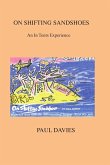Treading on Shifting Ground promises to be a deeply moving and important narrative work. It is a tale of resilience, love, loss, and the complex challenges of navigating a life caught between tradition and modernity in Papua New Guinea. This is not just a personal story, it's a window into a culture undergoing profound change, as seen through the eyes of a woman who has lived through immense personal hardship. The narrative unfolds with a vivid sense of place, grounding the reader in the "mist-shrouded mountains and fertile valleys" of Chimbu Province. Regina's early life, steeped in the rhythm of village traditions, is juxtaposed with her pursuit of education, a path that was "a rare achievement for a woman of her time." This set the stage for the central tension of the book : the push and pull between the old ways and the new. Regina's account of her marriage and its consequent disintegration is heart-wrenching. The betrayal, violence, and abandonment she experiences are depicted with raw honesty, promising to offer a powerful portrayal of domestic abuse and female resilience. The loss of her daughter to Aids, a disease that cast "a long, dark shadow over our nation," add another layer of tragedy, highlighting the broader social challenges facing Papua New Guinea. A particular significant aspect of Regina's story is the focus of her son's identity. As a "child of two worlds," belong fully to neither his mother's nor his father's culture, he embodies the complexities of a society in transition. The summary poignantly captures the mother's regret and the son's precarious position, "adrift" in a land where belonging is tied to ancestral land. This exploration of cultural identity, inheritance, and the challenges of urban life in Papua New Guinea is both unique and universally relatable. Regina's voice, as it emerges in the narrative, is strong and reflective. Her willingness to share her story, "so that (others) understand how I feel and experience as a female growing up in Papua New Guinea," suggests a desire to connect with readers on a deeply personal level. Ultimately, the book has the potential to be more than a memoir; it can be a testament to the strength of the human spirit and an important contribution to the literature of Papua New Guinea. It offers a story of a woman's journey and a reflection on the evolving landscape of our lives and societies.
Bitte wählen Sie Ihr Anliegen aus.
Rechnungen
Retourenschein anfordern
Bestellstatus
Storno








